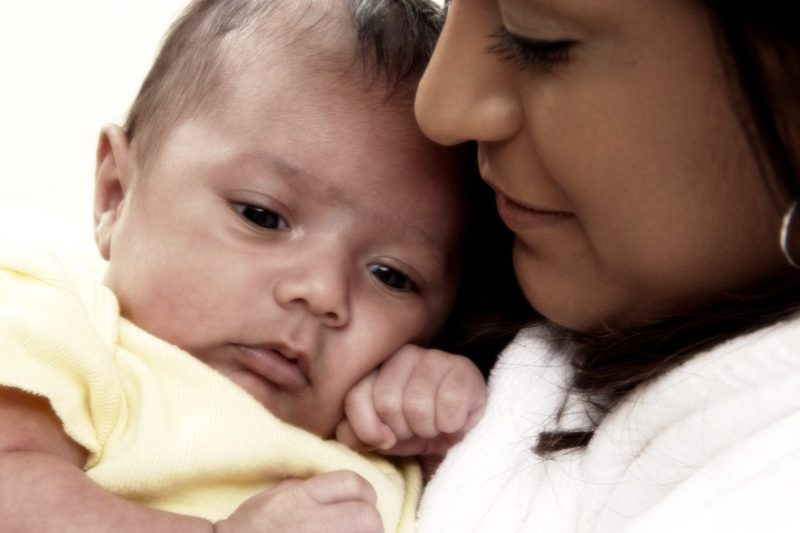California’s Minimum Wage Increase Is Not Enough for the Working Poor
Gov. Jerry Brown just signed a minimum wage increase into law. But if we really care about those living in poverty many of whom are Latinos and their children—the next step must be repealing the state’s "family cap" welfare reform that penalizes the poor for having children.

Earlier this month, California Gov. Jerry Brown (D) signed a law to raise California’s minimum wage to $15 an hour by 2022, giving a much-needed boost to poor working families across the state. The Fight for 15 movement has been driven by a diverse coalition that includes unions, workers’ rights advocates, and poverty advocates, as well as workers themselves.
The new minimum wage law is a glimmer of hope for many of the working poor upon whom the state depends. But their livelihoods have been stunted during the state’s decades-long push for welfare reform. The fight against poverty must include the repeal of draconian laws that punish the poor.
When I was growing up in Los Angeles during the ’80s and ’90s, my family was part of the working poor. Although I lived a good chunk of my childhood “near poverty”—but not “in” it, according to conventional definitions—poverty definitely came knocking on my family’s door more than once.
Things were tight financially, though my father worked a full-time job at a condiment factory. He returned home five days a week with the smell of vinegar seeping from every pore of his body, the fumes spilling out of our old Nissan. On the weekends, he would make every attempt to beat down the smell by cleaning, washing, and scrubbing anything that had come into contact with him.
The small amount of money my mother made taking care of other people’s children while trying to care for her own five children would not keep our family afloat. With two working parents, my family still depended on the weekly food handouts at our local church.
As the person who managed our household, my mother struggled to make ends meet. She finally lost that struggle the day my father came home with a frozen turkey in hand—his Thanksgiving bonus—and the news he had been laid off. Although the layoff was supposed to be temporary, there were no guarantees.
As an adult looking back, I am angered by the fact that poor children, parents, and women of color continue to exist on society’s margins with little hope of finding a respite. Today, more than two million children in California, including almost 70 percent who are Latino, live in poverty. This is exacerbated by the state’s socially conservative stance on welfare reform—a stance that’s in conflict with the state’s new minimum wage law.
For the last three years, California lawmakers, including Gov. Brown, have had the chance to help poor children by repealing the state’s Maximum Family Grant (MFG) rule, the family cap program introduced and signed into law by former Gov. Pete Wilson (R). Latino and Black children bear the brunt of this policy, which denies additional funds for newborn children whose parents are already receiving benefits through CalWORKs, California’s welfare-to-work program.
Family caps essentially punish poor people for their fertility. In California, the MFG continues the state’s legacy of eugenics and its efforts to control poor women’s bodies. The policy has only helped push poor parents of color and their children into deeper poverty. Additionally, women who challenge the MFG are required to prove their pregnancy was the result of rape or incest, or that one of the state’s listed pre-approved birth control methods failed. In California, as in many parts of the country, being a poor woman means the state will do its best to interfere with your reproductive decisions and society will shame you.
According to California Department of Social Services data, 57 to 60 percent of all households affected by the MFG are Latino households. Another 17 to 24 percent of affected households are Black. Perhaps not surprisingly, 25 to 33 percent of children affected by the grant live in Los Angeles County, with its high rate of child poverty. Another 31 to 39 percent live in the “Farm Belt” Central Valley.
As the oldest child, I understood the effects of poverty on a family at an early age. After my father was laid off, my mother was forced to seek government aid. It was a decision neither of my parents took lightly. My father is a proud immigrant and my mother a Mexican-American woman who grew up on the border. For my parents, the thought of taking government money to feed their children was filled with failure and despair.
I remember feeling the shame on my mother’s face pierce my skin like a needle as she stepped up to the cash register to pay for our weekly groceries with food stamps. The humiliation rushed through my veins as I helped her carry bags of produce, diapers, and milk home. Policies like the MFG exacerbate the shame society heaps upon the working poor.
No matter who you are or where you come from, everyone has needed a little help sometime in their lives. The best way to help hardworking and struggling California families is to repeal a classist, sexist, and racist policy whose effects are multi-generational and detrimental to hundreds of thousands of children. After the minimum wage increase, repealing the MFG will move California forward in the fight against poverty.

